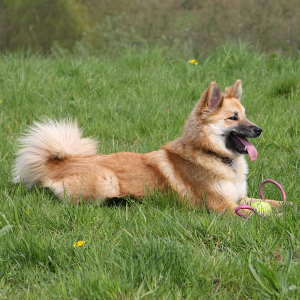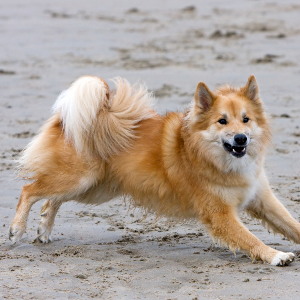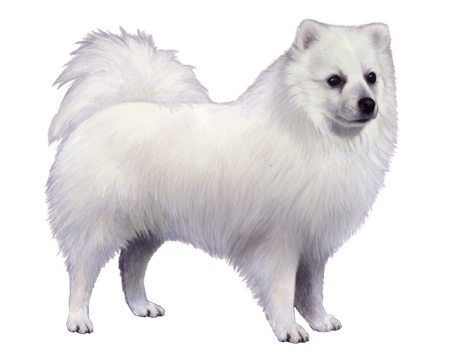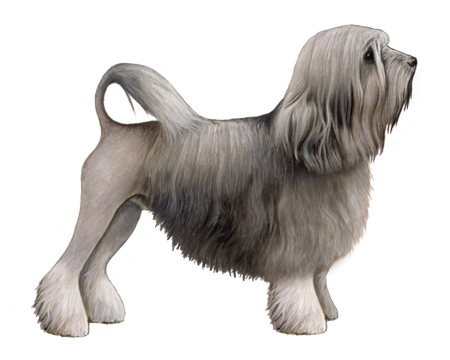
Icelandic Sheepdog
The Icelandic Sheepdog is an alert, active breed. Their vocal (but not aggressive) natures make them excellent guard dogs. And their outgoing and devoted personalities make them ideal family pets.
Interested in discovering if your dog is an Icelandic Sheepdog?
Check out Wisdom Panel's DNA tests.

Icelandic Sheepdog Traits
General Appearance
Icelandic Sheepdogs are just under medium-size with confident, lively bearings and gentle, intelligent expressions.
Coat and Coloring
The Icelandic Sheepdog can have two distinct coat types: short-haired or long-haired. Both are double-coated and have thick, soft undercoats and coarse outercoats. The long-haired Icelandic Sheepdogs, as their names suggest, have much longer hair. The short-haired Icelandic Sheepdogs have medium-length hair on their outer coats. The tails of both are bushy with lengths appropriate to their coat lengths.
Their coats can come in several colors. These include various shades of tan (ranging from cream to reddish-brown), chocolate brown, grey, and black. White is mixed with all of these colors, though it shouldn't be the predominant color. The most common white markings include a blaze on the face, collar, chest, socks, and the tip of the tail. Icelandic Sheepdogs with tan and grey coloring often have black masks and black tips on their tails. Black tri-color dogs have black coats with white and tan markings.
Distinctive Physical Traits
Icelandic Sheepdogs have a strong, almost rectangular build. They have short, tapered muzzles, medium, almond-shaped eyes with black rims, and erect ears with slightly rounded tips. Their bodies are long and muscular with no loose skin, and their tails are high set and curled over, touching their backs.
Icelandic Sheepdog Temperament
Icelandic Sheepdogs are cheerful, outgoing, curious, and playful dogs. They get along well with people and other animals and, though they will bark if strangers approach, they're not aggressive. These devoted dogs bond closely with their people and want to be part of all activities. Leave them alone too long, and they will become stressed and sad.
Icelandic Sheepdogs have strong herding instincts, and they tend to be vocal. Though these are excellent skills for moving livestock between pastures, they may not be ideal for families with small children (who the dogs will likely herd) or apartment life.
Icelandic Sheepdogs have great speed and stamina and require regular exercise. Due to their roots, the breed prefers cold weather and can overheat in high temperatures.


Icelandic Sheepdog History
Despite its name, the Icelandic Sheepdog is not from Iceland. To anyone's knowledge, there were no dogs on the uninhabited island of Iceland when Norse settlers arrived in 874 AD. The settlers brought their dogs—now known as Icelandic Sheepdogs—to help create a new Scandinavian nation.
The spitz-type dogs (with potential relations to Karelian Bear Dogs) were used to herd sheep, cattle, and horses and retrieve puffins from their underground burrows. Reportedly, the Danish Army used Icelandic Sheepdogs in the field, taking advantage of their stamina to deliver orders between units. Nowadays, the dogs perform search and rescue—and are still used for herding and searching for lost sheep.
In the mid-1500s, the British began exporting Icelandic Sheepdogs from Iceland. These herding dogs became faithful companions to the upper classes—but it was not just the wealthy who fell in love with the breed. English shepherds also coveted Icelandic Sheepdogs for their skill and work ethic and put them to work herding sheep in the countryside.
Its intelligence, devotion, and big "smile" have made the Icelandic Sheepdog a highly coveted breed. No longer just farm dogs, they are treasured family pets.
Icelandic Sheepdog Care
Nutrition
Icelandic Sheepdogs require high-quality dog food that's appropriate for their age and activity level.
Grooming
Due to their thick double coats, Icelandic Sheepdogs are profuse shedders that require regular grooming. Brush their coats at least once a week—and once a day during spring and fall shedding seasons—to remove dirt and prevent matting. Trim their nails and clean their ears to keep the breed looking and feeling its best.
A dental care routine, including at-home teeth brushing and professional dental cleanings, should be a regular part of their grooming. Start when Icelandic Sheepdogs are young to ensure good oral hygiene throughout their lives.
Exercise
Herding is a fast-paced activity that requires a lot of endurance, and Icelandic Sheepdogs are perfect for the job. In the absence of livestock to herd, these dogs need a lot of exercise to burn off their abundant energy. Icelandic Sheepdogs make excellent running or hiking partners and will gladly keep pace for miles. But even walks and play sessions can go a long way toward tiring out this energetic breed.
Icelandic Sheepdogs are smart, agile, and eager to please. These qualities make them naturals for dog sports such as competitive obedience, tracking, agility, rally, and, of course, herding. Their favorite activities are the ones they get to share with their people.
Training
Their laidback natures and eager-to-please personalities make Icelandic Sheepdogs easy to train. Sign them up for obedience classes when they're young to get off to a good start. It's best to focus on positive, rewards-based training—the breed does not respond well to harsh criticism. In no time, they'll master basic commands and learn new tricks.

Breed Group
Companion
This group consists of dogs typically bred for the specific purpose of human companionship, and many are popular pets because of their gentle nature. They became more common as the concept and luxury of dogs as pets prevailed.
Resources
https://www.icelanddogs.com/#/education/history
http://images.akc.org/pdf/breeds/standards/IcelandicSheepdog.pdf
https://www.akc.org/dog-breeds/icelandic-sheepdog/
Reviewed July 26, 2020 by Cindy Elston, DVM, MPH



























_Color.png)










